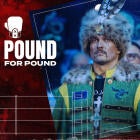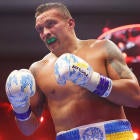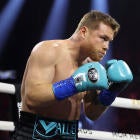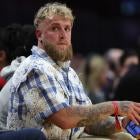Like all other forms of live entertainment, combat sports are no different when it comes to dealing with extenuating circumstances that threaten to cancel a performance.
"The show must go on, as they say," Lou DiBella, promoter of the Nov. 4 heavyweight boxing match between WBC champion Deontay Wilder and late replacement Bermane Stiverne told CBS Sports, in reference to Luis Ortiz being pulled in September for failing a drug test. "And Deontay Wilder still plans to put on a show for New York City."
Wilder-Stiverne II, a rematch of "The Bronze Bomber's" title-winning 2015 victory, isn't the only high-profile boxing or mixed martial arts bout to recently deal with a late change atop the marquee. It's also not anywhere near epidemic level as of yet.
But if you've watched closely the recent headlines, there does seem to have been a larger amount of fighters withdrawing because of injuries, drug issues or difficult weight cuts of late than in recent memory. And the immediate fallout creates complicated decisions -- typically financially driven --for promoters and fighters alike.
Stiverne (25-2-1, 21 KOs), the WBC's mandatory opponent, is the only fighter to take Wilder (38-0, 37 KOs) the full distance, but wasn't particularly impressive in doing so. Because of that, Wilder and his team have spent an extensive amount of time and step-aside money to avoid the rematch and seek a more difficult and career-defining challenge.
But after Ortiz became the third straight Wilder opponent to test dirty and cost the champion a scheduled fight, in walked Stiverne -- already scheduled on the undercard to face Dominic Breazeale -- to save the day.
Changing opponents this late in the game drives a promoter crazy, said DiBella, who calls the irony of Stiverne securing a fight he was paid to step aside from "a real mind f---."
Not only is finding an alternative date at an arena like the Barclays Center a difficult prospect, so is forcing a fighter like Wilder, who is already coming off a nine-month layoff, to delay an expected fight purse until 2018.
That doesn't even take into account Wilder's emotional turmoil, which included him posting numerous social media videos complaining about fighters being unwilling to face him on even terms.
"It saddens me. It makes me re-evaluate my career and it almost makes me lose the love for the sport of boxing," Wilder said during Tuesday's media teleconference. "It's starting to sicken me and I don't want feel that way about the sport of boxing. It makes me rethink my career. Am I better off out of this sport than in this sport?"
The result has DiBella feeling uneasy.
"For Deontay, I'm worried. I'm a little nervous and I'm sure he would tell me there's no reason to be nervous," DiBella said. "But this is why -- Nov. 4 at Barclays [Center in Brooklyn], this is a real freaking fight because Stiverne has nothing to lose. Zero. For him it's Christmas; for Deontay it's a disappointment of a night before it even starts.
"You have this big, big promotion coming and then you are trying to sell a fight that you know in your heart is still dangerous. But look, there's a level that you are not selling the same fight. You are selling something that happened already."
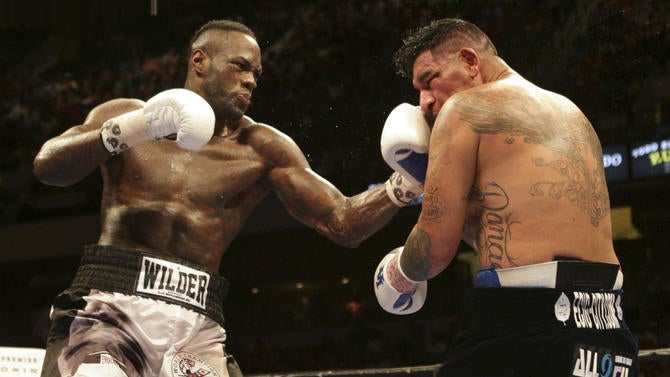
Showtime, which will televise Wilder-Stiverne II, also had plans to broadcast unified heavyweight champion Anthony Joshua's title defense in Wales one week earlier on Oct. 28, as a lead-in to a possible Joshua-Wilder pay-per-view megafight in 2018. But Joshua's mandatory opponent, former title challenger Kubrat Pulev, pulled out on Oct. 16 with a shoulder injury.
Joshua and promoter Eddie Hearn of Matchroom Sport were presented with a similar dilemma regarding what to do next. IBF rule allowed the next fighter in line to become the new mandatory and Hearn ultimately cut a last-minute deal with No. 3 rated Carlos Takam (35-3-1, 27 KOs).
For Joshua (19-0, 19 KOs), there was never a thought in his mind to cancel the card once Pulev withdrew. Pushing his return off until the spring would've made it one year since his breakthrough knockout of Wladimir Klitschko in April. But he was very clear in communicating the dangers that need to be considered when switching opponents just 12 days out from a fight.
"I can't afford to lose, and I don't want to lose," Joshua said during last week's public workout in Sheffield, England. "Boxing is a sport that's unforgiving in a sense that if Takam beats me, that loss will stay on my record for a lifetime. That will always be my legacy. It will not be, 'Oh, he was a world champion, and he did well for the sport of boxing.' No, no, no, no no. It would be, 'He's 19-1.' That's the new legacy and I just don't want that blemish on my record right now."
The fact that Joshua had spent more time in training camp focusing on improving his own weaknesses and building his strengths, as opposed to specifically tailoring his attack to Pulev, made the decision easier. But as the headliner and undisputed main draw on the card, there was more pressure and responsibility on Joshua to keep the show from folding than one might realize.
"From a fighter's point of view, you have to put the fight first," Joshua said. "Then the second point of view, I don't want to take away the opportunity for a lot of my friends on the undercard to lose out since they are not going to make the money. Then, you've got to think of the fans as well. There are so many people who bought hotels, took travel time and whatnot.
"So that's what I mean, before I thought of myself, I was like, 'Ooh. There are all these other people who have come out to have a good time and are depending on me. That's why I am really happy that the show will go on. Not just me, but a lot of people would've lost out on that night."
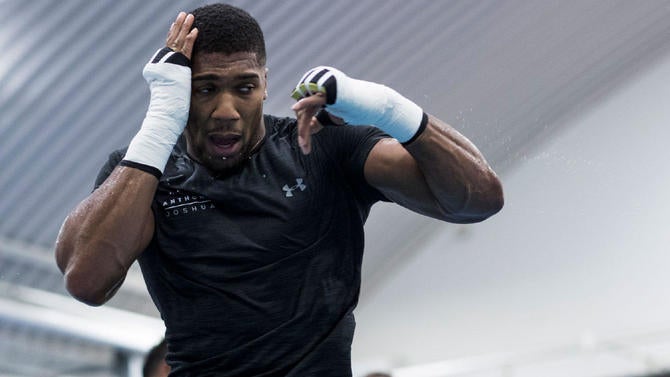
In a precautionary hedging of bets, Hearn revealed he had made a deal with Takam's team, even before Joshua entered camp for Pulev, to enter his own training camp on standby should anything happen.
According to DiBella, it's a fairly common practice.
"It's not unusual to have somebody in the background," DiBella said. "Because, to be honest, Stiverne was on, and it's no accident that the Stiverne-Breazeale fight was on the same show. It's an insurance policy. You don't want the heavyweight champion preparing for a fight, and getting really close to a fight, and have the fight not go down.
"It's not so unusual to have somebody in your back pocket."
With deeper undercards, UFC isn't as always dependent upon one name to keep a card afloat. Fighters had also been historically less likely to pull out or refuse replacements on short notice, sometimes out of fear for losing their spot or in hopes of garnering goodwill from management as "company men."
A turning point of sorts took place in 2012 when Dan Henderson pulled out of his light heavyweight title shot against Jon Jones eight days before UFC 151 after a partial rupture of his MCL. Jones was offered middleweight Chael Sonnen on short notice to save the card but refused after listening to advice from coach Greg Jackson that it would be the "biggest mistake of [his] career."
UFC president Dana White publicly tore into both Jones and Jackson, calling them "sport killers." The promotion then canceled the show and refused to reschedule it, making it the only "lost card" of the UFC's numerical system for big events, which is now at 216.
It took more years before big-name fighters would consistently follow Jones' lead. Now, in the aftermath of UFC's $4 billion sale to new owners WME-IMG in July 2016, more fighters have been willing to take a stand, despite the still-present criticism from White (just ask women's bantamweight champion Amanda Nunes in July).
The UFC's biggest problem of late has been difficult weight cuts threatening to derail big fights 24 hours before the card (the same scenario that befell Nunes at UFC 213 and Khabib Nurmagomedov at UFC 209). Lightweight Kevin Lee needed a second chance on the scale in early October at UFC 216 to save the main event and admitted to nearly "killing himself" in order to do so.
To attempt to curb those issues, UFC partnered with state athletic commissions beginning with California in June 2016 to move weigh-ins from Friday afternoons to the morning, giving fighters extra recovery time.
UFC 216 also saw an extremely late injury bug take a bite out of Fabricio Werdum's PPV main undercard bout when rising contender Derrick Lewis pulled out with a back injury just three hours before the fight.
Werdum, a former UFC heavyweight champion, didn't find out until he entered the locker room and received a call from manager Ali Abdel-Aziz telling him the fight was off. Knowing an impressive victory on such a big stage had the potential to set him up for another title shot, Werdum was stunned.
"Imagine everything is good for the coming to the arena [and now] I'm very sad for the first time," Werdum said at the UFC 216 post-fight news conference. "But my manager called me again two minutes later saying, 'Werdum, I might have one more fight for you.'"
Werdum was offered Walt Harris, who originally was scheduled to face Mark Godbeer on the undercard. After taking time to talk with his team and weighing out the dangers that come with having literally no time to prepare for a new opponent, Werdum accepted.
The 40-year-old's gamble paid off huge with a textbook submission victory in just 65 seconds that showcased his legendary grappling skills.
"It's a very hard decision. Imagine if you prepare your body and strategy for one guy, for Derrick Lewis for three months, and three hours changes everything," Werdum said. "It's so hard of a decision. [Harris] is a southpaw yet. He's a very good guy and I say thank you to him for accepting the fight. This is very hard for him and it's hard for me too. But I showed again that I have been waiting for the title shot."













